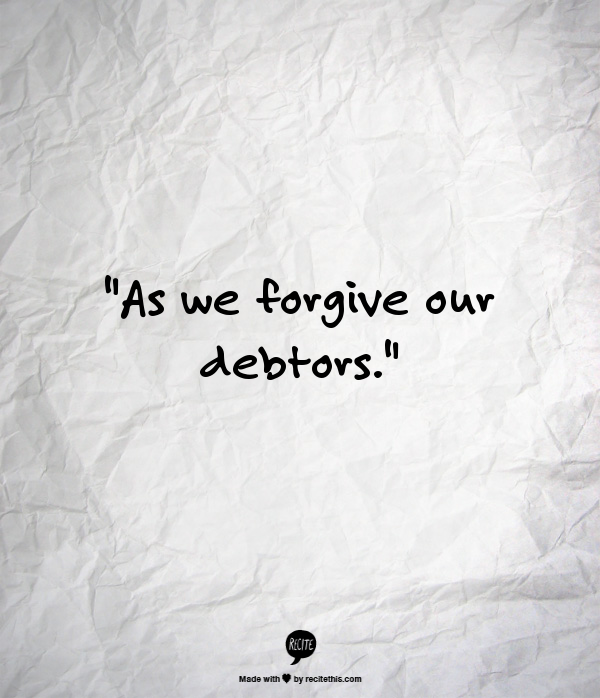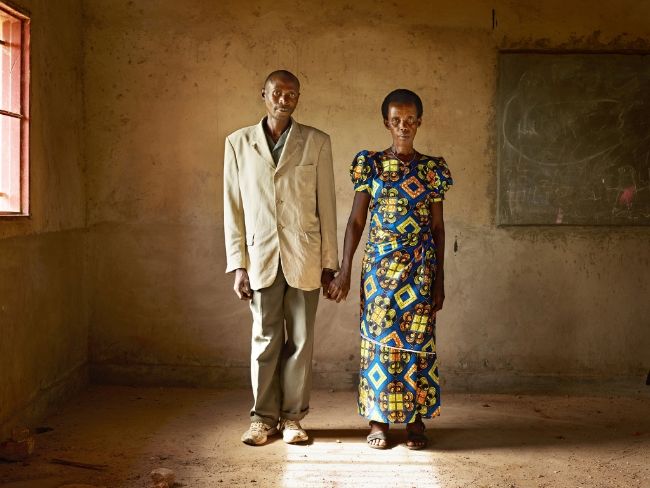
Debtors didn't offend us; debtors owe us.
If, when you consider where you should extend forgiveness, you think first of workplace foibles - of excusing tardiness, dismissing gossip, and generally tolerating annoyingness - then your struggle isn't unforgiveness. Your struggle is being too easily offended.
If it's lack of common courtesy (or sense) that burns you up, you don't need to forgive as much as you need to get over it.
I am wary of extending cheap grace and calling it forgiveness. I'm afraid that, when challenged by the doctrine of forgiveness, we choose to forgive foolishness, because it's too hard to forgive debts.
Cheap grace is:
"She took my baby name even though she knew I wanted to use it, but I forgive her."
"He clocks out early every day and I have to clean up alone, but I forgive him."
"She didn't text me back, but I forgive her."
Of course these offenses should be resolved, lest bitterness take root and brotherly love erode over time. But if these are the sorts of things you pride yourself in forgiving? Well, that forgiveness didn't cost you much. Your personal preference if anything. It's cheap grace.
Jesus didn’t die on the cross so you could politely tolerate annoyances or learn to let go of frustrations. Frustrations don't require the shedding of blood to be set right. Nobody ever had to die to make up for being kind of a jerk.
But the debt we owed to the God who requires justice? That debt had to be paid in blood. For generations God's people slayed a million lambs on a million alters, sin offerings, blood in their place. They did it right up until Jesus put an end to it. He was the spotless animal, the sacrifice - the Lamb of God, who takes away the sin of the world. When Jesus died in your place, He didn't do it because he was frustrated with you. He did it because you owed a debt you could not pay and live.
He demonstrated radical, scandalous, unthinkable, could-only-be-divine grace. And it cost Him.
The gospel is not a story of cheap grace.
So as I live out the gospel, I dare not cheapen it.
"But where sin abounded, grace abounded all the more." The bigger the offense, the bigger the forgiveness. That's how it works in God's economy.
To forgive our debtors will cost us. If it doesn't cost us, they weren't debtors. Real grace is anything but cheap.
//
I had this post half-written, waiting in my drafts, when I saw this article from the New York Times called "Portraits of Reconciliation." I saw the first image and my heart broke and leapt at the same time. I knew, "It's time."
The piece is a collection of portraits of victims of the Rwandan genocide with their perpetrators. The perpetrators that killed their husbands and fathers and children. The perpetrators that burned their houses down. The perpetrators THEY FORGAVE.
This is not cheap grace. This is huge, agonizing, torturous loss, and huge, lavish, unimaginable mercy. It was difficult for me to read, because my insides ache to think what this kind of forgiveness costs. But it challenged me. It forced me to consider my own ugliness - that I am first a sinner, and only then sinned against. It reminded me that people can do hard things - and God can do impossible things. It reminded me not to settle for cheap grace. I hope it reminds you, too.

Dominique Ndahimana Perpetrator (left)
Cansilde Munganyinka Survivor
NDAHIMANA: “The day I thought of asking pardon, I felt unburdened and relieved. I had lost my humanity because of the crime I committed, but now I am like any human being.”
MUNGANYINKA: “After I was chased from my village and Dominique and others looted it, I became homeless and insane. Later, when he asked my pardon, I said: ‘I have nothing to feed my children. Are you going to help raise my children? Are you going to build a house for them?’ The next week, Dominique came with some survivors and former prisoners who perpetrated genocide. There were more than 50 of them, and they built my family a house. Ever since then, I have started to feel better. I was like a dry stick; now I feel peaceful in my heart, and I share this peace with my neighbors.”
You can read the whole New York Times Article, and see more photos, here. I recommend it.